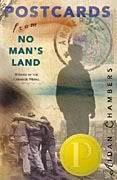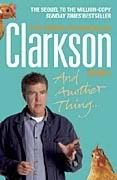|
an archive of my forays into fact and fiction
|
|
Rosencrantz & Guildenstern Are Dead; Tom Stoppard
— Love @ 23:04 Comments (3)
Filed under: A-Z Reading Challenge, B, Decades '08, English, Humour, Plays
 Rosencrantz & Guildenstern Are Dead Rosencrantz & Guildenstern Are Dead
by Tom Stoppard

For the Decades ’08 (first performed in 1967) and the A-Z reading challenges.
English
77 pages
e-book
First line: “Heads.”
Back cover blurb: n/a
Thoughts: A couple of years ago I saw bits and pieces of the 1991 film adaption of this play. I don’t remember a lot of it, just that it seemed totally absurd and quite funny. Exactly what my thoughts on the play are, in fact. It’s so completely bizarre and absolutely hilarious — I loved it.
Rosencrantz: Shouldn’t we be doing something — constructive?
Guildenstern: What did you have in mind?… A short, blunt human pyramid…?
R: Would you like to play Questions?
G: How do you play?
R: You have to ask a question.
G: Statement! One – love.
R: Cheating!
G: How?
R: I hadn’t started yet.
G: Statement. Two – love.
R: Are you counting that?
G: What?
R: Are you counting that?
G: Foul! No repetitions. Three – love. First game to…
Reading the script was in other words a nice experience (one that warrants a B in my way of thinking), but my plan now is to hunt down the film once more and actually, properly watch it this time.
As a small morsel of trivia, I can tell you that the street I live on is named after Rosencrantz. In case anyone else thinks that’s as neat as I do.
Postcards from No Man’s Land; Aidan Chambers
— Love @ 20:34 Comments (4)
Filed under: A, English, Fiction, GLBT interest, YA Challenge 2008, Young Adult
 Postcards from No Man’s Land Postcards from No Man’s Land
by Aidan Chambers

For the Young Adult reading challenge.
English
312 pages
Speak
ISBN: 0-14-240145-5
First line: Not knowing his way around, he set off back the way he had come.
Back cover blurb:
Jacob’s plan is to go to Amsterdam to honour his grandfather who died during World War II. He hopes to go, set flowers on his grandfather’s tombstone, and explore the city. But nothing goes as planned. Jacob isn’t prepared for love — or to face questions about his sexuality. Most of all he isn’t prepared to hear what Geertrui, the woman who nursed his grandfather during the war, has to say about their relationship. Geertrui has always been known as Jacob’s grandfather’s kind and generous nurse. But it seems that in the midst of terrible danger, Geertrui and Jacob’s grandfather’s time together blossomed into something more than a girl caring for a wounded soldier. And like Jacob, Geertrui was not prepared. Geertrui and Jacob lived worlds apart, but their voices blend together to tell one story — a story that transcends time and place and war.
Thoughts: This year I’ve revisited a lot of books I’ve read previously, but only in Swedish. This is another one of those. Aidan Chambers, I think, has to be one of my favourite authors of fiction for young adults. He deals with some of my favourite topics (if you hadn’t clued into the fact that I like gay-themed stories, then I might as well just come out and say it now. I like gay-themed stories! Young adult ones more than others), but in a quiet sort of way that I absolutely adore. Sometimes I wish he’d be more obvious and outspoken, but if I really think about it, I think I like it best the way it is now. It’s all there if you look for it (and you don’t have to look all that hard), but it’s not glaringly in-your-face either, which I have to say is nice. I like a bit of subtlety now and again.
Like I said, I hadn’t read this book in English before and doing it brought a new dimension or two that I hadn’t noticed before. In the Swedish translation, it wasn’t always so obvious that all the Dutch characters, when speaking English, were not using their mother tongue and that they had a Dutch accent (this was also the case with A Countess Below Stairs. I’d never known, before, that Anna’s accent was so noticeable, simply because it was lost in translation).
It was also a couple of years since I last read Postcards, which, again, brought a fresh perspective. The first time I read it, I wasn’t sold on the gay theme yet (that is not to say that I minded it, though). The second time, I had started to read more gay lit in general, so that part of the story appealed to me more than before, and this time, I have new experiences and views that I hadn’t on the previous occasions, and that made me appreciate the story even more.
“[…] Love is not finite. It is not that we each have a limited supply of it that we can only give to one person at a time. Or that we have one kind of love that can only be given to one person in the whole of our lives. It’s a ridiculous thing to think so. I love Ton. I sleep with him when we both want it. Or when one of us needs it, even if the other doesn’t want it then. I love Simone—“
“Simone?†Jacob said.
“She was here the other morning when you left. She called out to you. She lives two streets away. Ton and Simone know each other. They were friends before I met them. We’ve talked about it. Ton never sleeps with women. That’s the way he is. Simone only sleeps with me. That’s the way she is. I sleep with them both. That’s the way I am. They both want to sleep with me. That’s how we are. That’s how we want it. If we didn’t, or if any one of us didn’t, then, okay, that’s it. All the stuff about gender. Male, female, queer, bi, feminist, new man, whatever — it’s meaningless. As out of date as marriage forever. I’m tired of hearing about it. We’re beyond that now.â€
I was in a relationship at one time that went really bad, because the other party needed more than I could give, and while at the time I was terribly upset and depressed about it, in hindsight, I think that’s acceptable. That is, I think such a situation is acceptable if everyone involved is totally honest about what’s going on and the thing is talked about. In my situation, it wasn’t really, so there were hard feelings, a lot of anger on my side, and hurt feelings also.
Now I’m in a new situation, where the person I’ve fallen for is on another continent entirely and with another person at the same time as they are with me. I’ve never had an issue with this, because all along, between me and them, there’s been complete honesty and I’ve never been lied to. And this other person, my person, if you will, is okay with the fact that I might at some point want to find someone a little closer to me geographically. I might not find such a person, and if I did, they might not be okay with the situation I’m in, in which case I’m going to have to make decisions based on that. But that’s just how I feel. Everyone’s different, and different things are right for different people.
“[…] I’m not sure I’m — I dunno — strong enough. Brave enough. Not like you and Daan.â€
Ton gave a little huffing laugh. “Bravery it isn’t! It’s just how we believe life should be. Not for everyone. But for us. And people who think like us. We’re learning how to live it while we live it. What else is worth doing?â€
I’m pretty sure that told you more than you ever wanted to know about me, but can I help it that the book touched me so? ;D
I don’t like all of it, though. The character of Hille annoys me, and Geertrui’s parts of the story, while essential, did not move me quite as much as the present-day story of Jacob, Ton and Daan. In the end, though, the great parts of it completely outweigh the not so good and thus I’m still quite enamoured of the book. Much like Jacob fell in love with Amsterdam.
[…] the day (smiling to himself) he fell in love with the city. For I have, he thought, haven’t I? It’s just like falling for a person. Not wanting to be parted from it, wanting to know everything about it, liking it as it is, the bad as well as the good, the not so pretty as well as the beautiful, its noises and smells and colors and shapes and oddities. Liking its difference from everywhere else. And its history as well as its present. And its mystery, for there was so much he did not understand. And the people who had begun to show him how to see it, Daan and Ton.
Oh dear, I think this might be my longest thoughts on a book so far. I’d better start wrapping up by giving a rating. This is a tricky one. I’m not sure it reaches quite the heights of an A, but on the other hand a B doesn’t feel quite like enough. What shall it be, what shall it be? The deciding factor, I think, will have to be that I have, after all, read it not only once, or twice, but actually three times now, so obviously I like it a lot. An A then. And you should read it too. Just sayin’.
Standish; Erastes
— Love @ 13:38 Comments (2)
Filed under: Back to History, D, English, GLBT interest, Historical, Romance
 Standish Standish
by Erastes

For the Back to History reading challenge.
English
215 pages
P.D. Publishing Inc.
ISBN: 1-933720-09-3
First line: The candle guttered, and Ambrose looked up at it with a frown, the long blond hair falling away from the sides of his face.
Back cover blurb:
A great house. A family dispossessed. A sensitive young man. A powerful landowner. An epic love that springs up between two men. Set in the post-Napoleonic years of the 1820’s, Standish is a tale of two men — one man discovering his sexuality and the other struggling to overcome his traumatic past.
Ambrose Standish, a studious and fragile young man, has dreams of regaining the great house his grandfather lost in a card game. When Rafe Goshawk returns from the continent to claim the estate, their meeting sets them on a path of desire and betrayal which threatens to tear both of their worlds apart.
Painting a picture of homosexuality in Georgian England, Standish is a love story of how the decisions of two men affect their journey through Europe and through life.
Thoughts: From the moment I came across this book on Amazon.co.uk, I knew I had to read it. The story sounded amazing and I just love historical gay romance, there’s no denying that. Unfortunately, I was in for quite a disappointment.
I started reading it in January, got about a third of the way through during my first sitting with it, and then I put it down and did not pick it up again until now. I kept trying to persuade myself that if I read only one chapter a day, I would finish it in less than a month, but there just was no way of doing it. I wanted so badly to love the story, and I just couldn’t do it. I had such a hard time with the language and the way it was written — they didn’t appeal to me at all.
Finally, I picked it up again and found that if I just skimmed certain bits, it was tolerable. And so I finished the remaining two-thirds in a second sitting. I even, towards the end, found myself almost enjoying it. A part of the reason for this was, I dare say, the character of Padraig Fleury who appeared in the second half of the novel.
In the end, I didn’t like it even half as much as I had hoped to going in, but on the other hand, I did like it more than I thought I would after the first third. Even though it’s nowhere near the best book I’ve ever read, I am glad I decided to stick with it and read the entire thing. I have rarely been so close to making a book a DNF (did not finish), though. If it weren’t for the fact that I had it on my (no changes allowed) list of books for the Back to History challenge, or the fact that I had paid money for it and didn’t much like the idea of that being wasted, I don’t think I would have finished.
However, apart from all that I have outlined above, there was another thing that particularly bothered me. At one point Ambrose reads Dracula. Which is, y’know, cool and all. Except Standish is set in 1821 and Dracula wasn’t published until 1897, so unless there was time travel that I completely missed, that’s a big mistake on the part of the author, and that loses them a lot of respect from me.
I should think it obvious that the rating is not going to be a great one, but in the end, solely thanks to Fleury, it does manage a D, rather than an F. I realise we are only at the end of February and that much of the reading year remains, but I will be much surprised if this does not end up being “Disappointment of the Year.â€
The World According to Clarkson: And Another Thing…; Jeremy Clarkson
— Love @ 13:28 Comments (1)
Filed under: D, English, Humour, Non-fiction
 The World According to Clarkson: And Another Thing… The World According to Clarkson: And Another Thing…
by Jeremy Clarkson

English
340 pages
Penguin Books
ISBN: 978-0-141-02860-6
First line: I suppose all of us were out and about before Christmas, pummelling our credit cards to within an inch of their lives.
Back cover blurb:
Jeremy Clarkson finds the world such a perplexing place that he wrote a bestselling book about it. Yet, despite the appearance of The World According to Clarkson, things — amazingly — haven’t improved. Not being someone to give up easily, however, he’s decided to have another go.
In And Another Thing… the king of exasperated quip discovers that:
- bombing North Carolina is bad for Yorkshire
- we can look forward to exploding at the age of 62
- Russians look bad in Speedos. But not as bad as we do
- wasps are the highest form of life.
Thoughts: I love Top Gear, which, if you’re unfamiliar with it, is an outrageous sort of motor programme that even such car un-enthusiasts as myself can thoroughly enjoy. As Clarkson is one of the three presenters on the show, I found it hard to resist when I saw a copy of one of his books in a bookstore. After reading it, I discovered that it had been better for me had I managed to resist the temptation. Simply put: he drives me up the wall and infuriates me with pretty much every little column he’s ever written. I have thus come to the conclusion that I will keep watching, and enjoying, Top Gear, but will keep as far away as possible from anything of Clarkson’s that is not directly related to the show. (I now have to figure out if I should give in to the temptation to read any of the books by James May and Richard Hammond (the two other presenters), or if it’s best to just stay away from those as well.)
As for the rating, a D will do.
Den hemlösa sexualiteten: en antologi
— Love @ 13:21 Comments (0)
Filed under: A-Z Reading Challenge, D, GLBT interest, Religion, Swedish, To Be Read
 Den hemlösa sexualiteten: en antologi Den hemlösa sexualiteten: en antologi
by a number of different authors
 & & 
For the A-Z and To Be Read reading challenges.
Swedish
286 pages
Bokförlaget Libris
ISBN: 91-7195-402-3
First line: n/a
Back cover blurb:
Homosexualitet är en av de mest brännande frågorna i kyrkorna i dag. Ämnet väcker starka känslor. Många tycker att det är svårt att ta till orda, andra tycks redan vara klara med frågan.
Antologin Den hemlösa sexualiteten vill medverka till ett konstruktivt och nyanserat samtal i kyrkan om homosexualitet. Om kristen tro innebär att man ställer hela livet i relation till Gud och evangeliet, då är homosexualitet också en teologisk angelägenhet för kyrkan. Det väcker frågor om:
- Vad säger Bibeln om homosexualitet?
- Vilken syn har kristna på sex och samlevnad?
- Hur ska kyrkorna reagera inför de orättvisor som homosexuella drabbas av?
- På vilka villkor kan homosexuella välkomnas i församlingen?
- Kan partnerskap välsignas i kyrkan?
Författarna till Den hemlösa sexualiteten tar upp dessa och andra frÃ¥gor. UtgÃ¥ngspunkten är klassisk kristen tro i förening med lyhördhet och respekt inför de homosexuellas situation. FrÃ¥gorna blir belysta ur fyra olika perspektiv — bibliska, etiska, kulturella och pastorala. De 18 författarna representerar olika kristna traditioner.
Boken ger inga färdiga svar, men läsaren får hjälp att själv orientera sig i frågorna utifrån en kristen livsvärld.
Thoughts: This is another book I got in the 2006 book sale and that has been in my TBR-pile ever since. Unlike Profile of a Criminal Mind it is actually included on my list for the TBR-challenge, so I can strike one off there now. Yay!
Another thing that differs compared with Profile… is that I really liked that one, and I didn’t particularly like this. I have to admit that when I bought it, I thought it was a different sort of book than it turned out to be. I initially thought that it was a collection of essays by Christians who were positive when it came to homosexuality, perhaps homosexual themselves, and how they managed to make their beliefs and their sexualities match. That was not the case, however. Rather, the approach in the book is more along the lines of “hate the sin, love the sinner.†Interesting, yes, but also a little prone to making me angry. I will not touch on that too much, but I will mention one thing in particular: it drives me absolutely nuts that people so often seem to think that bisexuality always means a complete lack of ability to be monogamous. Seriously, people, homosexuality, bisexuality and heterosexuality are on a completely different scale than monogamy vs. polygamy/polyamory. You can be heterosexual and polyamorous, or you can be bisexual and monogamous. Just because a person has the ability to be attracted to persons of both genders1, doesn’t mean that they want to be with people of both genders at the same time. (Sorry for rambling, but that really is a pet peeve of mine.)
I’ve mentioned it before, but I find rating non-fiction quite difficult. A book can be well-written and well-argued, but if I personally don’t agree with the views expressed in the book, that will obviously colour the grade I give it. Keep that in mind when I now dole out a D to Den hemlösa sexualiteten.
1. Or is attracted to people with a complete disregard of gender. I am being consciously simplistic here.
|
|
 Rosencrantz & Guildenstern Are Dead
Rosencrantz & Guildenstern Are Dead

 Postcards from No Man’s Land
Postcards from No Man’s Land Standish
Standish The World According to Clarkson: And Another Thing…
The World According to Clarkson: And Another Thing… Den hemlösa sexualiteten: en antologi
Den hemlösa sexualiteten: en antologi &
& 